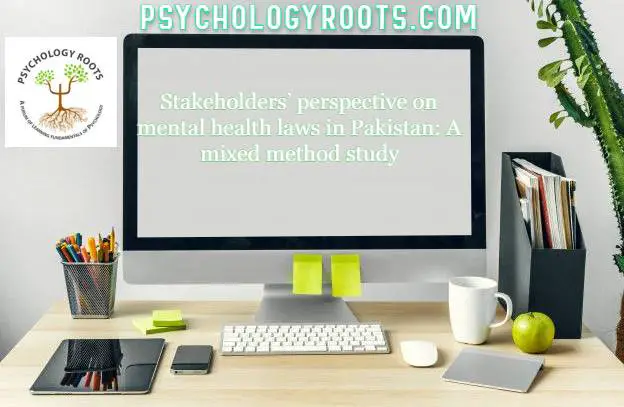Table of Contents
Stakeholders’ perspective on mental health laws in Pakistan: A mixed method study
Here in this post, we are sharing the article on “Stakeholders’ perspective on mental health laws in Pakistan: A mixed method study”. You can read the abstract of the article with a download link. We have thousands of articles in our collection (See articles). You can demand us any article related to psychology through our community, and we will provide you within a short time. Keep visiting Psychology Roots.
About Stakeholders’ perspective on mental health laws in Pakistan: A mixed method study
The present study explored awareness and opinions pertaining to mental health legislation in Pakistan in the context of the United Nations Convention on Rights of People with Disabilities (UNCRPD) through a mixed-method research design. In the quantitative arm of the study, a structured questionnaire examined the awareness and opinions of key stakeholders pertaining to national mental health legislation.
In the qualitative arm, face-to-face interviews further elaborated stakeholders’ perspectives pertaining to these topics with thematic analysis conducted. Stakeholders demonstrated a good awareness of legislation pertaining to guardianship (83.0 %) appointment of property managers (89.7%) and salary or pension entitlements (89.2%).

Stakeholders’ perspective on mental health laws in Pakistan: A mixed method study
Compared to other stakeholders, patients had less understanding of processes pertaining to involuntary admission (χ2 = 20.54, p = 0.02) and appointing a guardian (χ2 = 34.67, p < 0.01). High consensus across stakeholders was noted for processes of involuntary detention (83.5%) and appointment of guardians or property managers (80.0%) albeit patients demonstrated less agreement on these topics (p <0.01). Minimal support was noted for an involuntary patient to be discharged solely on a psychiatrist’s recommendation (25.4%).
Thematic analysis indicated fifteen emergent themes: 1) Alienation/ Seclusion; 2) Capacity building; 3) Communication Gap; 4) Conflict of interests; 5) Discomfort at the hospital; 6) Economic burden; 7) Government’s liability; 8) Family involvement; 9) Imbalance; 10) Acceptance of Legal Incapacity; 11) Legal reforms; 12) Patient-centered environment; 13) Quality assurance; 14) Underdeveloped infrastructure and 15) Potential unethical practices. This study advocate for increased patient involvement in collaborative decision-making with mental health professionals and the creation of more appropriate inpatient treatment environments.
Authors of Stakeholders’ perspective on mental health laws in Pakistan: A mixed method study
- Muhammad Tahir Khalily
- Aziz ur Rehman
- Mujeeb Masud Bhatti
- Brian Hallahan
- Irshad Ahmad
- Muhammad Ifzal Mehmood
- Shamsher Hayat Khan
- Bilal Ahmed Khan
Avail Article [sociallocker id=64051]
[/sociallocker]
Need Any Other Article:
Are you looking for any other article? Don’t Worry, We provide you free and quickly. Just need to create a query in our community.
Information:
The purpose of our website is only to help students to assist them in finding the best suitable instrument for their research especially in Pakistan where students waste a lot of time in search of the instruments. It is totally free of cost and only for creating awareness and assisting students and researchers for good researches. Moreover, it is necessary for you to take the permission of scales from their representative authors before use because copyrights are reserved by the respected authors.
Help Us Improve This Article
Did you find an inaccuracy? We work hard to provide accurate and scientifically reliable information. If you have found an error of any kind, please let us know.
Add comment. we appropriate your effort.
If you have any scale or any material related to psychology kindly share it with us at psychologyroots@gmail.com. We help others on behalf of you.
Follow